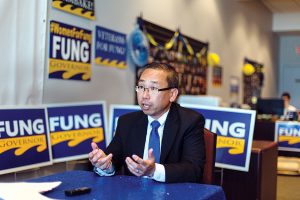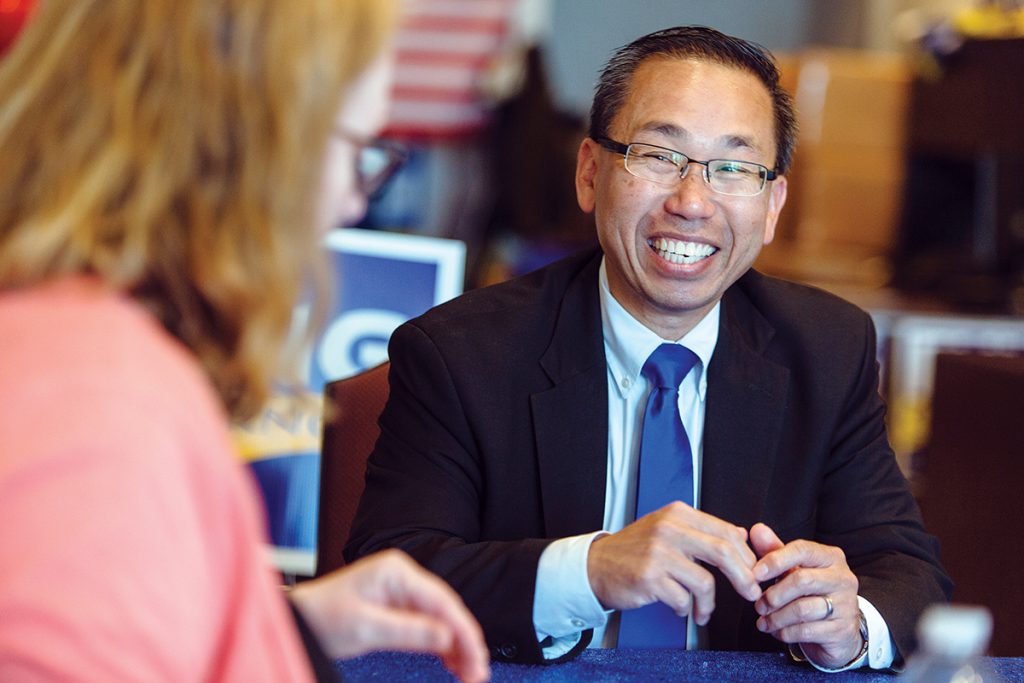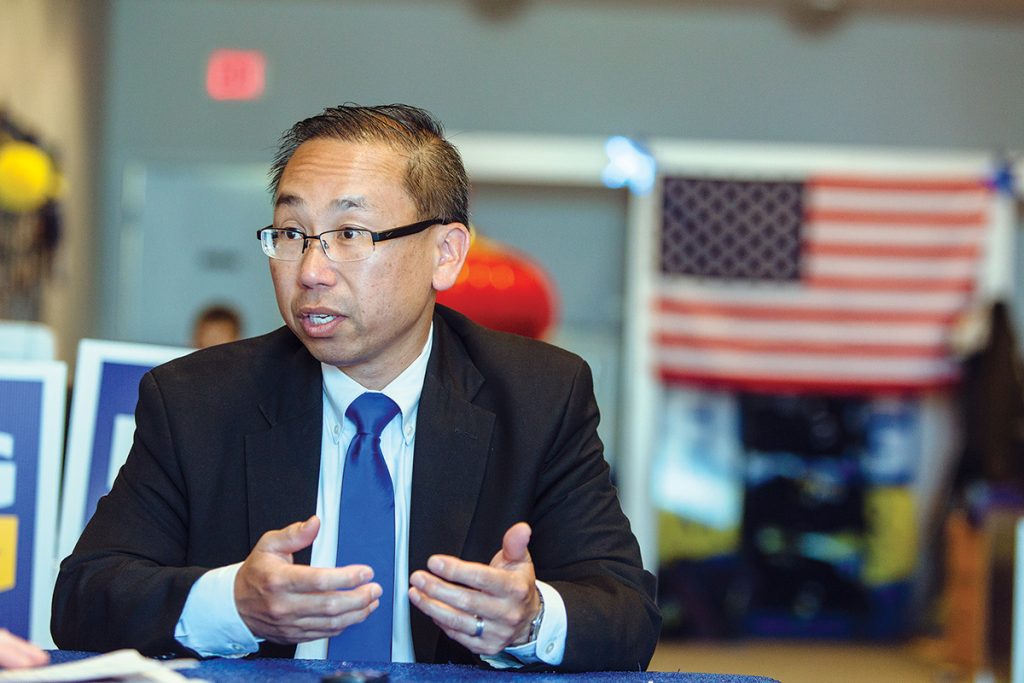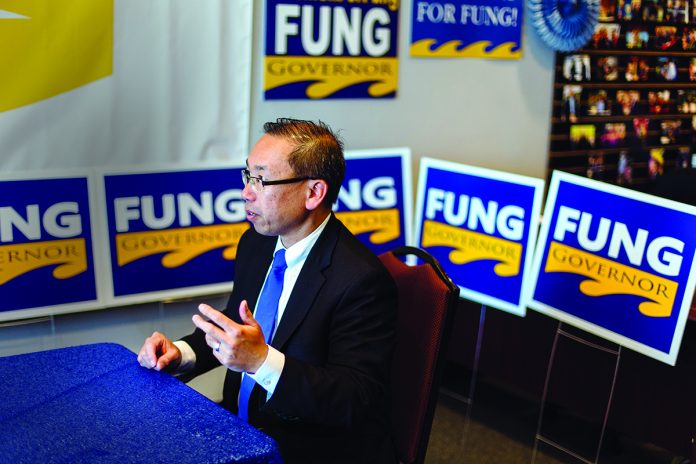Allan W. Fung, the nine-year mayor of Cranston, has launched a second campaign for governor, once again targeting now-incumbent Gina M. Raimondo, and pointing to his record as a fiscal conservative. As governor, he said he would cut many of the economic-development programs Raimondo introduced, if not abolish them altogether, and instead would lower business taxes and the state sales tax to 5 percent.
“I hate the one-offs,” he said, referring to the one-company agreements negotiated by the R.I. Commerce Corp. “I would rather lower the tax rates for all. That 5 percent [sales tax] would make us the lowest in New England, outside New Hampshire, which doesn’t have it. There is a corresponding impact. That will sustain a lot of the smaller businesses, the local economy, which dot our landscape.”
See related story:
Candidates differ on lowering tax burden
Fung, 48, will run on the Republican ballot for the Sept. 12 statewide primary. In 2014, he bested Kenneth J. Block for the GOP nomination but was defeated in the general election by Raimondo, a Democrat who had 40.7 percent of the vote to Fung’s 36.2 percent.
A graduate of Suffolk University Law School and Rhode Island College, Fung was the first in his family to graduate from college. His parents, who emigrated from Hong Kong, raised him and his siblings on the South Side of Providence. First elected as an at-large councilman in Cranston in 2003, he was elected mayor in 2008. Before entering politics, he worked as a lobbyist for MetLife and as a prosecutor with the U.S. Attorney’s Office in Providence.
Through March 31, the most recent reporting period, his campaign had raised $315,826, including a $25,000 loan from the candidate.
Why are you running and why is it different this year than four years ago? I learned a lot from four years ago and that election. But most importantly, I just do not like the direction this governor and her administration have taken the state.
She’s actually hurt a lot of people. Whether it’s the rollout of the [Unified Health Infrastructure Project] system, which left many of our most vulnerable waiting in lines, with the uncertainty of whether or not they were even going to get the benefits that they were entitled to. In fact, my family was caught up in that UHIP debacle, with my dad, when he was applying for long-term care benefits.
They lost his application not once but twice. In seven months, we were left wondering and waiting what was going to happen.
[caption id="attachment_213287" align="alignright" width="300"]

LOCAL CONTROL: Cranston Mayor Allan W. Fung, a Republican candidate for governor, said he would support a voter referendum for the proposed natural gas power plant in Burrillville, adding that local control and local decision-making works in Rhode Island. / PBN PHOTO/RUPERT WHITELEY[/caption]
In terms of the political climate, what’s changed in terms of four years ago? What’s changed is the mood of the state shares my sentiment exactly. People are very frustrated and disappointed with our current governor, how she’s mismanaged the state, and the ineffective leadership that she’s brought to Rhode Island.
Has this mood shift been evident in polls? Not even polls. It’s from actual experiences I’ve had myself, with my family, conversations that I’ve had with other individuals. Even seeing the public polls and our own internal polls. Her job-approval ratings are horrendous.
And it’s not just trying to capitalize on it. I’m frustrated, like many Rhode Islanders. We need a change. I’ve got that experience, in the nine years where I’ve been mayor, where we’ve helped a lot of individuals [and] taking the city out of that fiscal crisis that we had when we first got into office.
See PBN's interviews with other candidates:
Gov. Gina M. Raimondo
Former R.I. Sec. of State Matt Brown
R.I. Rep. Patricia L. Morgan
How has your experience as the Cranston mayor prepared you to be governor? It’s a large, complex city but some might argue it is not as complicated as being governor. That’s not true. You actually handle more day to day and have more interactions with your residents in every facet. Cranston, now being the second-largest city [in Rhode Island], we now have everything a governor would experience. You’re the chief executive … of a major corporation, [with] a major budget. You face how you would handle a deficit, long-term [fiscal] problems … even natural disasters, such as floods or major snow storms.
In nine years as mayor, what was the single most challenging issue you dealt with? Just a lot of the finances, and the pension was a big part of the problem. We handled our pension in a different way, unlike the governor, [who] forced it upon a lot of retirees. We had an honest dialogue with our union members and our retirees and negotiated a reform that helped put the plan back on a path toward better stability.
Your campaign strategy appears oppositional, targeting the governor. Do you think the primary race is irrelevant? I learned a lot from that first campaign four years ago. I’m a lot stronger as a candidate, a lot more disciplined. My sights are set on the biggest problem in the state, and that’s our governor and her inefficient management. I’m going to keep calling her out at every step with a lot of the problems that she has caused in this state. … Not that I’m taking my eye off my primary opponents, because I never underestimate anyone, but we are running a strong campaign with our messaging, coming out and letting people know what we’ve done in Cranston, the successes we’ve had, which is going to translate into turning the state around.
One of your campaign emails that focused on the UHIP computer-system problems used the language ‘U R Screwed.’ Any regrets on using that kind of language? I’m being honest with people. That’s the feeling of so many Rhode Islanders who depend on that system for their benefits. And I don’t see an end in sight. I’ve always been honest with the residents of Cranston. I share in the frustration of many Rhode Islanders who are still waiting for their benefits.
One of your campaign statements suggested you’re an outsider. You’ve been in a position of power for several years. Can you really play that role? From the Statehouse perspective? Absolutely.
How do you differ from your opponents in the primary? First and foremost, I’m chief executive of a major city, who has implemented a lot of policies that’s turned a city that was in the red around. A lot of the skills I’ve brought forward here and learned in Cranston, and utilized, [represent] the same type of initiative I’ll take at the Statehouse, focusing on making sure that we have an agenda of cuts, focusing on our business owners [who] are here, and not just this corporate-welfare strategy that the governor loves to take, so she can pad her resume and say, “I’ve got Johnson & Johnson, I’ve got General Electric here.”
What is your position on the Burrillville natural gas plant and the LNG plant in Providence? Should the state encourage those projects? First and foremost, I’ve always been a strong supporter of local control and local decision-making, and it works in this state. So, I feel it’s problematic when the people in Burrillville don’t really have a say or a vote on it. I would support a referendum.
Do you think [the proposed Burrillville plant is] a good idea? I would support whatever local support would have. Even when we [considered] the casino, the people in Newport didn’t want it but the people in Tiverton did.
So, you’re saying you don’t think Burrillville should move forward, because the people don’t want it? Put it on the ballot. Let the voters in Burrillville decide. I’m a strong proponent of local control. It can work.
What about the Fields Point LNG plant? I haven’t studied that issue too much; I’m more focused on Burrillville.
On gun restrictions, you were criticized for not reacting to the shootings in Texas. What is your position on gun restrictions? We have some of the strongest laws already in existence, on the books. And … that criticism that I’ve done nothing is absolutely false. Take a look at what we’ve done in Cranston. This is where people all across Rhode Island can take a look and see what we’ve done. We’ve actually acted. From day one, school security has been an important issue that my administration [has] taken seriously. … We first and foremost did assessments at all of our schools and made sure there were single points of entry at all of the schools. … We have school resource officers … about four of them. They are members of the police force. In this year’s budget, I added an additional $100,000 into the police line to support additional patrols and details for all of the buildings. It comes down to making sure we have the safest learning environment for the kids. … In addition to the budget, we added additional dollars to support one, possibly two, social workers to address some of the issues that many students, principals and administrators see that could be signs … of rage.
On your economic plan or tax policy, your showpiece issue is lowering the sales tax from 7 percent to 5 percent. How would this be phased in? A half of a percentage each year over the course of that first term. It’s approximately $70 million per year.
How would you counter that lost revenue? Are you already thinking of things that could be cut? Absolutely. One of the things I do realize is that some of the revenue will stay in Rhode Island. It will stop that border flight, going into Massachusetts. The $70 million is a static capture, if nothing else happens. Some of the cuts I’ve talked about, on the campaign trail, I would certainly shake up economic development – a lot of the millions that have been given out as incentives, especially in that so-called Rebuild RI, where it doesn’t create any long-term, lasting jobs, outside of a few construction jobs. I would reshape all of those millions that are there.
You’re talking about the economic incentives that were created under the Raimondo administration. Would you discontinue them? That’s a possibility. There are a lot of different incentive programs that I certainly don’t subscribe to.
Rebuild RI is one of the larger ones. You don’t feel it has any value? It has some value, but the question is, how much of an investment? What is your [return on investment] on those investments? My ROI is looking for permanent, sustainable jobs for the long run.
The argument they make is that if you rehab an old, vacant building, you’re adding tenants, you’re adding to your economic base.
Sure. But you also have historic tax credits, too. They have petered out but there is still a few million there.
[caption id="attachment_213286" align="aligncenter" width="696"]

LOW-FEE PROMISE: Gubernatorial candidate Allan W. Fung, mayor of Cranston, says Rhode Island should have a reputation of being low in taxes and low in fees. He wants to reduce business fees to put money back in the pockets of owners, who he says have been struggling. / PBN PHOTO/RUPERT WHITELEY[/caption]
Is that something you would replenish? I’m looking at cutting. … I hate the one-offs. The one-company [agreements]. I would rather lower the tax rates for all. That 5 percent [sales tax] would make us the lowest in New England, outside New Hampshire, which doesn’t have it. There is a corresponding impact. That will sustain a lot of the smaller businesses, the local economy, which dot our landscape. The second cut I want to make is in fees, the Low Fee Guarantee.
How will that help small business? It will help a lot of individuals, a lot of professionals, small businesses. I want to have our state have a reputation that … we are low in taxes, low in fees. That kind of mantra will put even a few hundred dollars back into an owner’s pocket. To even start a business here, the articles of incorporation, is $230 … versus $100 in New Hampshire or $130 in Maine. With some of the auto-body permit fees, $900 for a shop owner in Rhode Island, half of that in Massachusetts.
Is this really inhibiting small-business creation in Rhode Island? Coming from a small-business background, my family’s restaurant, it’s a real pain. People think, “Oh, you’re a business owner, you’re making money hand over fist.” Well, I saw those months where my parents never cashed their own check or had to pull money out of their own pockets to keep operations afloat.
One of the big incentives rolled out under Raimondo’s administration was the qualified-jobs act, meant to lure new companies to the state. Do you think those are worthwhile? If they’re used judiciously, in the right way. The problem I see with this governor is, instead of giving tax breaks across the board, she’d rather go after these big companies.
Is your concern that average Rhode Islanders are getting shut out of these jobs? I’m concerned average Rhode Island businesses are being left out. The ones that have been struggling. … We have a governor [who is] out of touch, a staff that’s out of touch with Rhode Island.
What are your thoughts on the $15 minimum wage proposal? We’ve already had several rounds of increases toward the minimum wage. That’s not something I can support at this point.
On RhodeWorks, should it be implemented? And if not, how are you going to fix the roads and bridges? I never supported the tolls. One of those gantries could be in Cranston’s backyard, off [Interstate] 295. My philosophy would be, she put in additional revenue for the legalization of [sports] gambling. Well, if that’s newfound revenue, why not just get rid of the tolls.
You mentioned sports betting. What is your position on that? I’m a fantasy-sports guy. I’m not going to sit here and be a hypocrite. That’s something I would support. However, we cannot just rush into it like this governor is doing. We have to do the proper legal vetting to make sure we don’t have to go back for voter approval. I’m looking at that from a legal perspective.
On the affordability of housing, as well as supply, do you have any position on that? I recognize it is still an issue, making sure we have sufficient workforce housing. That is a challenge. A lot of the employers face the challenges that employees go through on a day-to-day basis.
Is Medicaid spending being reined in appropriately [by the governor]? Is it something that even needs to be cut? Before we can even have that honest discussion about Medicaid spending and any type of reforms, we can’t have an honest discussion until we fix the UHIP problems. That system was supposed to be part of that reform, where it’s rooting out duplication and making sure people are appropriately on it.
[caption id="attachment_213288" align="aligncenter" width="696"]

PBN PHOTO/RUPERT WHITELEY[/caption]
What would you suggest the state do with UHIP? Would you just cancel it and start all over? I certainly wouldn’t be relying on Deloitte [Consulting LLP], like the governor has, and re-upped them for whatever period of time. What I would probably do is bring in some outside eyes, some [information technology] experts that can answer the question, can this be fixed? If it can’t be fixed in the way it was originally intended, then stop digging. I don’t care if we have to go back to a paper system in the interim and hire more frontline workers to process not only the new applications but the re-certifications, and the people who are waiting, who are still on the backlog. It’s frustrating to … the large amounts of employers who are impacted, too. We’ve seen a few nursing homes go out of business.
On the Pawtucket Red Sox, what is your position? I don’t support taxpayer financing of the PawSox deal.
The House speaker is proposing some kind of a tax-increment financing district around the ballpark. Would you support state tax funds for that district? Not for the stadium. As the governor, I would offer support to the PawSox, who I would love to have here, in different ways – on infrastructure. Even like with what happened at Patriot Place, helping with Route 1 [in Foxborough, Mass.]. Not on a stadium. That’s not the business we should be getting into.














